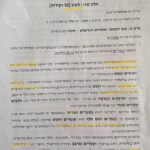In The Spymasters of Israel (Ballantine, 1980), Stewart Steven wrote (pp. 79-80): “During the Iraqi crisis in 1951, when Jewish emigration was being threatened by the activities of Israeli agents in Baghdad, Shaul Avigur sought from David Ben-Gurion an important statement of principle: Never in future should any Israeli intelligence organization make use of local Jews or local Jewish organizations.”
Avigur, described as “the spiritual father of modern Israeli intelligence,” succinctly told Ben-Gurion: “The creation of the State of Israel must not bring suffering but hope to local Jewish communities around the world. If, he said, the Egyptian authorities find a spy ring run by Israelis in Egypt, then the Israelis will suffer. If they find that local Jews are involved, then the whole Jewish population will suffer. That has been the golden rule for the Israeli intelligence services ever since.”
Military Intelligence doctrine in mid-1951 under Colonel Binyamin Gibli held that in any future war, Israel must utilize a fifth column inside Egypt to blow up Egyptian civil and military installations and disrupt Egypt’s ability to effectively wage war.
That year, Israeli Military Intelligence officer Avraham Dar arrived at Cairo airport from London, posing under the alias of British businessman John Darling. It was Avraham Dar’s—or John Darling’s—job to find Gibli a team, a group of sleeper agents inside Egypt, ready to be activated on command.
Once John Darling established his cover, he immediately contacted an undercover Zionist organization whose aim was to assist Egyptian Jews emigrating to Israel, upon which Darling began recruiting local Jews.
In 1952, Gibli decided that the team should be brought to Israel for training. In direct charge of the operation was Lieutenant Colonel Mordechai “Motke” Ben-Tsur, an ex-field intelligence officer in the Palmach, and now the officer commanding Unit 131, the single most secret unit in the Israeli Army. Unit 131 ran all of Military Intelligence’s special operations.
Eventually trained to use weapons, explosives, radio communications and the like, each member of the group made his own way back to Egypt, there to await orders.
Steven: “The philosophy behind Operation Suzanna was simple – childishly so. Israel’s political, military and strategic position in the Middle East was being irretrievably weakened by the failure of Western policymakers to discern the truth of the nature of the Egyptian revolution. They had been manipulated by clever Egyptian public relations; the true face of Nasser was being concealed by a skillfully contrived mask.
“Israel’s task was to rip that mask away; it had failed to do so by diplomacy, now direct action was called for. The public and the governments of Britain and America must be shown the latent hostility to the West and Western in-fluences which existed within the Egyptian revolution.
“Operation Suzanna was to achieve that end. According to the plan, British and American property in Egypt-embassies, information and cultural centers and commercial buildings-was to be attacked and burned. Communists and the ultra-right-wing force, the Moslem Brotherhood, would be blamed. The Egyptian security forces would be forced to crack down on them, and they would respond in kind. The country would be racked with civil unrest, and at last the Egyptian junta would be seen in the West for what it was. So, at the eleventh hour, the West would change its policies and British forces would be obliged to stay.
“Darling’s ring-would be activated; their task: to burn down American and British installations and then stand back while the Egyptians took the blame.”
Egyptian press announced ten men and one woman were being held on charges of sabotage, arson, and espionage, writing: “A bloody Zionist gang has been arrested and charged with the recent wave of arson attacks on public places in Egyptian cities.”
The term “conspiracy theory” hadn’t yet been popularized. The story seemed like such an incredible claim that initially even sophisticated Egyptians didn’t believe it. Outside Egypt, no one did. Israeli Premier Moshe Sharett called the reports “despicable slanders designed to harass the Jews in Egypt.”
Emphasizing Avigur’s alleged insistence on safeguards to protect Jewish communities worldwide, Steven wrote in a footnote: “I suggested to a senior Israeli intelligence man that, while I accepted that this rule may exist in theory, in practice it was difficult to see the Israelis not making use of the Jewish contacts they possess around the world. ‘If the rule didn’t exist in theory, then it would have to exist pragmatically,’ he said. ‘If you are looking for Israeli agents, where better to look than the synagogue, the local Jewish organizations, houses of the ghetto, or among Jewish business leaders. Obviously that’s where any rival security agency is going to look, and equally obviously because of that we have to stay, even if we didn’t want to, well away.’”
However, in By Way of Deception (St. Martin’s Press, 1990), Mossad whistleblower Victor Ostrovsky presents a different, perhaps less romanticized description of Israeli methods: “The next day Ran S. delivered a lecture on the sayanim, a unique and important part of the Mossad’s operation. Sayanim assistants must be 100 percent Jewish. They live abroad, and though they are not Israeli citizens, many are reached through their relatives in Israel. An Israeli with a relative in England, for example, might be asked to write a letter saying the person bearing the letter represents an organization whose main goal is to help save Jewish people in the diaspora. Could the British relative help in any way?

“There are thousands of sayanim around the world. In London alone, there are about 2,000 who are active, and another 5,000 on the list. They fulfill many different roles. A car sayan, for example, running a rental agency, could help the Mossad rent a car without having to complete the usual documentation. An apartment sayan would find accommodation without raising suspicions, a bank sayan could get you money if you needed it in the middle of the night, a doctor sayan would treat a bullet wound without reporting it to the police, and so on. The idea is to have a pool of people available when needed who can provide services but will keep quiet about them out of loyalty to the cause. They are paid only costs. Often the loyalty of sayanim is abused by [field officers] who take advantage of the available help for their own personal use. There is no way for the sayan to check this.
“One thing you know for sure is that even if a Jewish person knows it is the Mossad, he might not agree to work with you – but he won’t turn you in. You have at your disposal a non-risk recruitment system that actually gives you a pool of millions of Jewish people to tap from outside your own borders. It’s much easier to operate with what is available on the spot, and sayanim offer incredible practical support everywhere. But they are never put at risk – nor are they privy to classified information.
“…The one problem with the system is that the Mossad does not seem to care how devastating it could be to the status of the Jewish people in the diaspora if it was known. The answer you get if you ask is: “So what’s the worst that could happen to those Jews? They’d all come to Israel? Great.”
Part Three will examine how and why during 1950-1951, over 90% of Iraq’s flourishing Jewish community of 130,000 emigrated to Israel.
Part 1: How does Jewish Agency know 1 million Jews ‘expected’ imminently to flee Diaspora? Analysis





